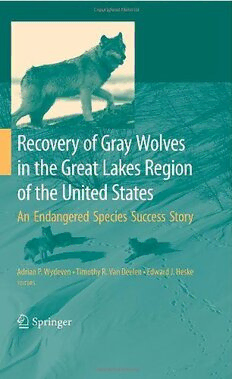Download Recovery of Gray Wolves in the Great Lakes Region of the United States: An Endangered Species Success Story PDF Free - Full Version
Download Recovery of Gray Wolves in the Great Lakes Region of the United States: An Endangered Species Success Story by Curt Meine (auth.), Edward Heske, Timothy R. Deelen, Adrian P. Wydeven (eds.) in PDF format completely FREE. No registration required, no payment needed. Get instant access to this valuable resource on PDFdrive.to!
About Recovery of Gray Wolves in the Great Lakes Region of the United States: An Endangered Species Success Story
The western Great Lakes region of the United States is the only portion of the lower 48 states where wolves were never completely extirpated. This region contains the areas where many of the first modern concepts of wolf conservation and research were developed, and where many early proponents of wolf conservation such as Aldo Leopold, Sigurd Olson, and Durward Allen lived and worked. The Great Lakes region also is the first place in the U. S. where "endangered" wolf populations recovered. During this recovery, we learned much about wolf biology and ecology, endangered species management, carnivore conservation, landscape ecology, depredation management, and social aspects of wildlife conservation. "Recovery of Gray Wolves in the Great Lakes Region of the United States," traces wolf recovery from diverse perspectives ranging from ecology, management, and policy to the cultural, social, and historical significance of wolves.
Detailed Information
| Author: | Curt Meine (auth.), Edward Heske, Timothy R. Deelen, Adrian P. Wydeven (eds.) |
|---|---|
| Publication Year: | 2009 |
| ISBN: | 9780387859521 |
| Pages: | 359 |
| Language: | English |
| File Size: | 5.98 |
| Format: | |
| Price: | FREE |
Safe & Secure Download - No registration required
Why Choose PDFdrive for Your Free Recovery of Gray Wolves in the Great Lakes Region of the United States: An Endangered Species Success Story Download?
- 100% Free: No hidden fees or subscriptions required for one book every day.
- No Registration: Immediate access is available without creating accounts for one book every day.
- Safe and Secure: Clean downloads without malware or viruses
- Multiple Formats: PDF, MOBI, Mpub,... optimized for all devices
- Educational Resource: Supporting knowledge sharing and learning
Frequently Asked Questions
Is it really free to download Recovery of Gray Wolves in the Great Lakes Region of the United States: An Endangered Species Success Story PDF?
Yes, on https://PDFdrive.to you can download Recovery of Gray Wolves in the Great Lakes Region of the United States: An Endangered Species Success Story by Curt Meine (auth.), Edward Heske, Timothy R. Deelen, Adrian P. Wydeven (eds.) completely free. We don't require any payment, subscription, or registration to access this PDF file. For 3 books every day.
How can I read Recovery of Gray Wolves in the Great Lakes Region of the United States: An Endangered Species Success Story on my mobile device?
After downloading Recovery of Gray Wolves in the Great Lakes Region of the United States: An Endangered Species Success Story PDF, you can open it with any PDF reader app on your phone or tablet. We recommend using Adobe Acrobat Reader, Apple Books, or Google Play Books for the best reading experience.
Is this the full version of Recovery of Gray Wolves in the Great Lakes Region of the United States: An Endangered Species Success Story?
Yes, this is the complete PDF version of Recovery of Gray Wolves in the Great Lakes Region of the United States: An Endangered Species Success Story by Curt Meine (auth.), Edward Heske, Timothy R. Deelen, Adrian P. Wydeven (eds.). You will be able to read the entire content as in the printed version without missing any pages.
Is it legal to download Recovery of Gray Wolves in the Great Lakes Region of the United States: An Endangered Species Success Story PDF for free?
https://PDFdrive.to provides links to free educational resources available online. We do not store any files on our servers. Please be aware of copyright laws in your country before downloading.
The materials shared are intended for research, educational, and personal use in accordance with fair use principles.

